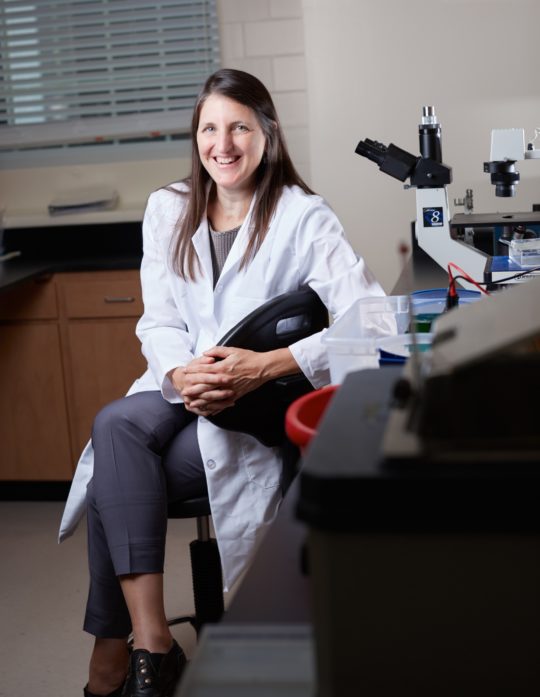Elisabeth Barton, Ph.D.
Elisabeth Barton
Professor of applied physiology & kinesiology & associate dean
College of Health and Human Performance
2020 Awardee
Elisabeth Barton, molecular physiologist and professor in the Department of Applied Physiology and Kinesiology, studies how cellular interactions and genetics can influence muscle function. She specializes in understanding how muscle tissue repairs itself, and her findings shed light on how the process can be accelerated.
“As molecular physiologists, we really look at changes in muscle function that are observable in the whole tissue or animal, and try to dig under the hood to understand the genes and the signals that drive those processes,” Barton said. She added that muscles are “biological machines” and that understanding them can be like putting together a puzzle.
“I think I’ve always been interested in taking things apart and putting them back together. Growing up, my family had puzzles everywhere – we would put them together and obsess over the jigsaw puzzle of the moment, crowded around a little card table,” she said. “I think that kind of puzzle building and solving is part of what helps with science in general.”
Among the puzzle pieces Barton examines in her work is one of the muscle’s natural repair agents, a growth-stimulating protein called IGF-1, which plays a central role in muscle growth. Barton is currently the principal investigator on a new grant from the National Institutes of Health to harness photosynthesizing plant cells to produce an edible source of the protein that can boost muscle regeneration, especially in injured or elderly patients.
“The beauty of using the chloroplasts in a plant is that there are thousands of them in a leaf, and for every chloroplast that’s there, you have a very efficient production machinery for producing whatever protein you happen to have encoded in it,” said Barton, who earned her bachelor’s degree in biophysics from Wellesley College in Massachusetts and her Ph.D. in physiology and biophysics from the University of Washington. “The long-term vision of this research is that you could plant a field of therapeutic lettuce that would happen to have your drug of choice in it, harvest the lettuce and then be able to use the protein for that therapy.”
Barton also studies how muscles sense load. In healthy patients, understanding the proteins that relay to muscle cells how much weight is being applied to them can enable athletic trainers to develop targeted regimens for faster results. But genetic mutations in these protein pathways can also lead to muscular disease, and understanding these mutations can lead to faster patient diagnoses. Barton is currently collaborating with UF physician-scientist Peter Kang, also a UFRF professor, to test whether symptoms of a rare type of muscular dystrophy can be modeled in rodents and cells, helping illuminate the disease’s defining features and genetic roots so new treatments can be developed.
Barton, who arrived at UF in 2015, said a fascination with the natural world and a penchant for finding new answers continue to drive her interests and collaborations. But it’s a humbling process.
“I think as I ask more questions, I realize how little I know. Early on in my career, I was very uncomfortable with that idea – I felt like I needed to know everything,” she said. “But now, I have come to accept the idea that ‘I don’t know’ is a perfectly reasonable feeling to have. It prompts me to look to others for what they know, work more collaboratively and embrace ‘I don’t know’ as part of the scientific process.”
Barton, who previously helped lead the Department of Anatomy and Cell Biology at the University of Pennsylvania’s School of Dental Medicine, is the acting associate dean of faculty and staff affairs at UF’s College of Health and Human Performance. She also directs the Physiological Assessment Core in the UF Myology Institute.
Learn more about Barton’s work.


